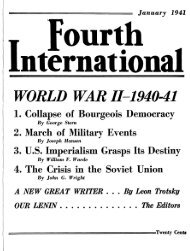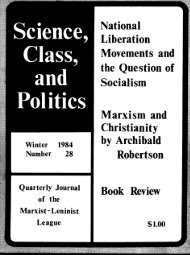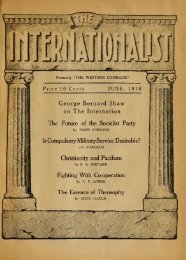The Stalin school of falsification - Marxists Internet Archive
The Stalin school of falsification - Marxists Internet Archive
The Stalin school of falsification - Marxists Internet Archive
Create successful ePaper yourself
Turn your PDF publications into a flip-book with our unique Google optimized e-Paper software.
<strong>Stalin</strong> School <strong>of</strong> Falsification -- Chapter 9<br />
saying now? You are making a fetish <strong>of</strong> the worker's state, and are seeking to sanctify the given state as a<br />
special sort <strong>of</strong> state "by divine dispensation." And who is the most accomplished theoretician <strong>of</strong> such<br />
sanctification? It is Molotov. That is his contribution. I shall again read you what he said. You have<br />
suppressed my criticism <strong>of</strong> Molotov, while Pravda has distorted it. But here is what Molotov said against<br />
Kamenev at the Fourteenth Party Conference <strong>of</strong> the Moscow district:<br />
"Our state is a workers' state. . . . But we are being <strong>of</strong>fered a formula according to which it would be<br />
more correct to say that the working class must be drawn still closer to our state. . . . What is this? We<br />
must set ourselves the task <strong>of</strong> drawing the workers closer to our state, but what is our state -- whose is it?<br />
Is it not that <strong>of</strong> the workers themselves? Is it not the state <strong>of</strong> the proletariat? How is it possible then to<br />
draw closer to the state, i.e., to draw the workers them selves closer to the working class which is in<br />
power and which is controlling the state?" (Pravda, Dec. 18, 1925.) <strong>The</strong>se are Molotov's words. This,<br />
comrades, is the most dull witted criticism <strong>of</strong> the Leninist concept <strong>of</strong> a given workers' state which can<br />
become genuinely and completely a workers' state only with the accomplishment <strong>of</strong> a colossal work <strong>of</strong><br />
criticism, correction and improvement. But according to Molotov, the given state is something absolute<br />
which it is no longer possible to draw closer to the masses. It is to this bureaucratic fetishism that my<br />
refutation, or rather my ex position <strong>of</strong> the Leninist analysis <strong>of</strong> the Soviet state, applies. [Shouts.]<br />
You say here, "What must be done?" If you really are <strong>of</strong> the opinion that there is nothing to be done<br />
against the phenomena I have indicated, then it means that you concede the revolution is bound to perish.<br />
Because, on the present path, it must perish. It means that you are the real pessimists, even if you are<br />
smug. Yet it is entirely possible to remedy the situation with a change <strong>of</strong> policy. But before we can<br />
decide what to do, we must say what is; we must specify the direction in which the processes are<br />
moving. If you were to consider such an acute problem as the housing question, you would discover that<br />
two processes are occur ring here, reflected in statistics that you can easily verify: <strong>The</strong> proletariat is<br />
undergoing a shrinkage in living quarters while the other classes are expanding. I am not even referring<br />
to the village, where construction is proceeding apace. Of course it is not the poor peasants who are<br />
building, but the tops, the kulak and the strong middle peasant. But what have we in the cities? <strong>The</strong><br />
so-called "kastari" [handicraft workers], i.e., the petty bourgeoisie, the small business men the traders<br />
and the specialists-all <strong>of</strong> them occupy this year more cubic feet per person. But there is less space per<br />
worker this year than last year. Before there is any talk <strong>of</strong> what to do, we must honestly state the facts.<br />
Just as in the housing question, so in every-day life, in literature, in the theater and in politics-the<br />
non-proletarian classes are expanding, getting elbow room, while the proletariat is being squeezed and is<br />
shrinking. I repeat: Just as the bourgeois classes are expanding in the material sphere -- you can observe<br />
this on the streets, in the stores, in the trolleys and in the apartments -- just so in politics; the proletariat<br />
as a whole is being shrunk, while oor party regime strengthens this class shrinkage <strong>of</strong> the proletariat.<br />
This is the fundamental fact. <strong>The</strong> blow threatens from the Right-from the side <strong>of</strong> the non-proletarian<br />
classes. Our criticism must be aimed to rouse the proletariat to take cognizance <strong>of</strong> the impending danger,<br />
and not to permit the proletariat to think that power has been conquered irrevocably and for all time,<br />
regardless <strong>of</strong> the conditions; and that the Soviet state is presumably an absolute which remains a workers'<br />
state always and under all conditions. It is important that the proletariat should understand that in a<br />
certain historical period, especially with a false policy <strong>of</strong> the leadership, the Soviet state may become an<br />
apparatus through which power may be shifted from the proletarian base and drawn to the bourgeoisie,<br />
which would subsequently discard completely the Soviet covering and transform its power into a<br />
Bonapartist rule. With a false political line such a danger is quite real.<br />
Without an international revolution, socialism cannot be built. Without correct policies, calculated on the<br />
http://www.marxists.org/archive/trotsky/works/1937-st2/sf09.htm (8 <strong>of</strong> 21) [06/06/2002 15:07:02]

















